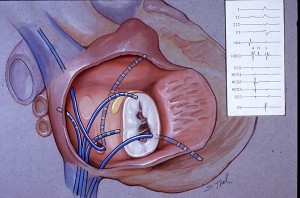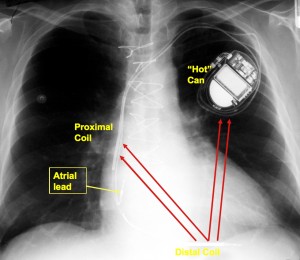A Month Before A Heart Attack, Your Body Will Warn You With These 8 Signs
Are you sure that your lifestyle is healthy enough to stave off a heart attack?
Here is a list of risk factors for heart attacks: smoking, unhealthy diet and obesity, lack of exercise, alcohol use, high blood pressure and diabetes. If you are an average person or an average world citizen for that matter, you probably sport one or more of these risk factors.
Chest Pain
This is the most obvious sign of an impending heart attack. If you have a blocked artery or having a heart attack, you may feel pain, tightness, or pressure in your chest.
Men and women experience chest pains in different intensities and forms. In men, this symptom refers to the most important early signs of an impending heart attack that should not be ignored. On the other hand, it affects only 30% of women.
Shortness of Breath
Breathlessness, or dyspnoea, is a common symptom of several medical conditions, heart problems being one of them. If the heart muscle is not pumping effectively, pressure can build up within the lungs and the chambers of the heart, creating the sensation of breathlessness.
It often occurs among men and women for up to 6 months prior to having a heart attack.
Breathlessness, or dyspnoea, is a common symptom of several medical conditions, heart problems being one of them. If the heart muscle is not pumping effectively, pressure can build up within the lungs and the chambers of the heart, creating the sensation of breathlessness.
It often occurs among men and women for up to 6 months prior to having a heart attack.
Insomnia
Insomnia is also associated with an increased risk of a heart attack or stroke. A decrease in oxygen levels — caused by changes in the heart due to heart disease — may trigger subtle changes that lead to anxiety, insomnia, and agitation that can’t be explained by normal circumstances. People who’ve had a heart attack often realize afterwards they began to experience anxiety and sleep problems in the months before the attack. Could this be the body’s way of warning you that something’s not right?
Abdominal pain
Abdominal pains, empty/full stomach nausea, feeling bloated, or an upset stomach may sometimes be warning symptoms of heart attack. It’s easy to attribute these to indigestion or acid reflux disease instead of a heart problem. These symptoms are equally likely to occur among women and men.
Poor circulation and lack of oxygen circulating in the blood (caused by a weak heart or blocked arteries) can lead to nausea, indigestion, or vomiting, particularly in women or people over 60.
Chronic Fatigue
If you are constantly feeling tired and sluggish, and it’s unprecedented, there might be a lack of blood flow to your heart. This generally occurs when there is a large build-up of plaque in the arteries that carry the blood to-and-from the heart.
Hair Loss
Losing your hair is considered to be just another visible indicator of the risk of heart disease. Most commonly it affects men over 50, but some women may also be in the risk group. Baldness is also associated with an increased level of the hormone cortisol. However, if you have this symptom, there are other diseases other than heart disease that should be ruled out.
Irregular heartbeat
It’s normal for your heart rate to increase when you’re nervous or excited, but if you feel like your heart is beating out of time for more than just a few seconds, or if it happens often, it might be a sign that you’re having an arrhythmia that may lead to a heart attack.
Excessive perspiration
Unusual or excessive sweating is an early warning sign of a heart attack. It might occur at any time of the day or night. According to WebMD, breaking out in a cold sweat for no obvious reason could also signal a heart attack. However, other diseases, should also be ruled out.
Moreover, it’s more common for women to experience excessive sweating and it’s often confused with the hot flushes associated with menopause.
You may contact or visit us: click here
dr mary joseph mercader
Cardiologist-Electrophysiologist
Medical Plaza Makati
Suite 1706
Amorsolo St. Legazpi Village Makati City
Insomnia is also associated with an increased risk of a heart attack or stroke. A decrease in oxygen levels — caused by changes in the heart due to heart disease — may trigger subtle changes that lead to anxiety, insomnia, and agitation that can’t be explained by normal circumstances. People who’ve had a heart attack often realize afterwards they began to experience anxiety and sleep problems in the months before the attack. Could this be the body’s way of warning you that something’s not right?
Abdominal pain
Abdominal pains, empty/full stomach nausea, feeling bloated, or an upset stomach may sometimes be warning symptoms of heart attack. It’s easy to attribute these to indigestion or acid reflux disease instead of a heart problem. These symptoms are equally likely to occur among women and men.
Poor circulation and lack of oxygen circulating in the blood (caused by a weak heart or blocked arteries) can lead to nausea, indigestion, or vomiting, particularly in women or people over 60.
Chronic Fatigue
If you are constantly feeling tired and sluggish, and it’s unprecedented, there might be a lack of blood flow to your heart. This generally occurs when there is a large build-up of plaque in the arteries that carry the blood to-and-from the heart.
Hair Loss
Losing your hair is considered to be just another visible indicator of the risk of heart disease. Most commonly it affects men over 50, but some women may also be in the risk group. Baldness is also associated with an increased level of the hormone cortisol. However, if you have this symptom, there are other diseases other than heart disease that should be ruled out.
Irregular heartbeat
It’s normal for your heart rate to increase when you’re nervous or excited, but if you feel like your heart is beating out of time for more than just a few seconds, or if it happens often, it might be a sign that you’re having an arrhythmia that may lead to a heart attack.
Excessive perspiration
Unusual or excessive sweating is an early warning sign of a heart attack. It might occur at any time of the day or night. According to WebMD, breaking out in a cold sweat for no obvious reason could also signal a heart attack. However, other diseases, should also be ruled out.
Moreover, it’s more common for women to experience excessive sweating and it’s often confused with the hot flushes associated with menopause.
You may contact or visit us: click here
dr mary joseph mercader
Cardiologist-Electrophysiologist
Medical Plaza Makati
Suite 1706
Amorsolo St. Legazpi Village Makati City
Suite 1706
Amorsolo St. Legazpi Village Makati City




















